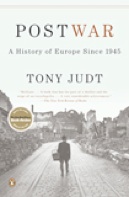 Paralyzed from the neck down, English Historian Tony Judt is nevertheless writing a series of memory vignettes in The New York Review of Books. The most recent one, in the February 25 issue, includes a section about his experiences in France and Germany during the 1968 “revolutions”, which he now refers to as sadly parochial.
Paralyzed from the neck down, English Historian Tony Judt is nevertheless writing a series of memory vignettes in The New York Review of Books. The most recent one, in the February 25 issue, includes a section about his experiences in France and Germany during the 1968 “revolutions”, which he now refers to as sadly parochial.
The West, he says, was playing at revolution while in the East, cataclysmic events were unraveling in Poland and Czechoslovakia. Yet Judt, “… a well-educated student of history of East European Jewish provenance…” believed, along with many others, that Czechoslovakia’s Dubcek was just another reformist turncoat. In short, the real revolution was trying to happen in the East.
How sad that Judt should be suffering from ALS and how fine that he manages to keep writing.
He first came to my notice with the magnificent and sweeping Postwar. That history, along with Norman Davies’s Europe, finally brought the history of Eastern Europe out of the shadows.
He writes in that book that it was understandably tempting to tell the story of Europe’s unexpected recovery after 1945 in a self-congratulatory, even lyrical key. He admits that there is a kernel of truth to this. Americans, Canadians, and the Brits did fight a good fight. But Judt point out that this is only half the story. So did the Poles, and in many ways, theirs was a more desperate fight under much worse odds with far more mixed results.
The benign peace of Western Europe was mirrored by the peace of the prison yard enforced by the tank in Eastern Europe.
And Eastern Europe is not faraway place. In Judt’s words, the history of the two halves of post-war Europe cannot be told in isolation.
Everything that Judt says seems to be self-evident now, but it wasn’t always so. At a recent dinner party, I heard how we really have to be grateful for Stalin for what he did for us. While there is an element of truth in that statement, it makes me feel very “un-Canadian”. For who is “us”? Canada? Maybe so. But if enslaving millions was the price to be paid for peace, the cost has never been properly counted.
Historical grievances are boring, so I don’t want to continue in this vein. What I’m interested in is the stories that have come out of that dark, dark place.